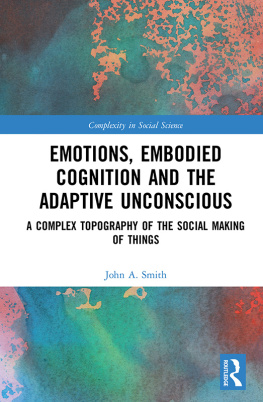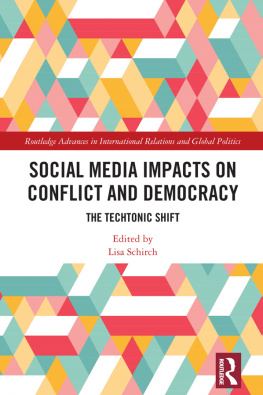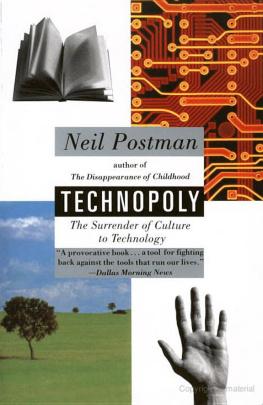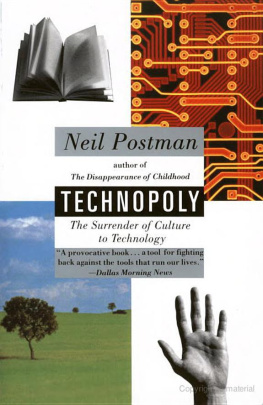First published in the UK in 2017 by
Intellect, The Mill, Parnall Road, Fishponds, Bristol, BS16 3JG, UK
First published in the USA in 2017 by
Intellect, The University of Chicago Press, 1427 E. 60th Street,
Chicago, IL 60637, USA
Copyright 2017 Intellect Ltd
All rights reserved. No part of this publication may be reproduced, stored in a retrieval system, or transmitted, in any form or by any means, electronic, mechanical, photocopying, recording, or otherwise, without written permission.
A catalogue record for this book is available from the British Library.
Copy-editor: MPS Technologies
Cover designer: Holly Rose
Production manager: Matthew Floyd
Typesetting: Contentra Technologies
Print ISBN: 978-1-78320-688-9
ePDF ISBN: 978-1-78320-689-6
ePUB ISBN: 978-1-78320-690-2
Printed and bound by Bell and Bain Ltd, UK
S ome years back I contacted an online dictionary, so as to determine why I didnt come up with anything in their database when I searched for the word technopoly. The kind gentleman who responded told me, however, that the neologism would need to demonstrate a certain amount of currency before it could be included in his companys dictionary. Supplying the word with some currency, then, provides part of the original impetus behind this collection of essays, especially since I know of no other single word that quite captures the phenomenon to which Neil Postman (1993) gives name. To a considerable extent, what he means by technopoly is similar to what Jacques Ellul (1964) calls la technique, what Marshall McLuhan (1964) refers to as technological trauma, or what Willem Vanderburg (2000) identifies as the labyrinth of technology.
No doubt the word has likewise been insufficiently prominent because of the complexity of what it denotes. Among the phenomena it encapsulates, for instance, are information overload, scientific management, scientism, and other forms of socio-technical conflict writ large and small. But it also includes the contemporary moral crises associated with questions related to autonomous technology, corporatism, Pentagon capitalism, totalitarian technocracy, and American global hegemony. Postmans neologism is a rich concept akin to that of postmodernity (Strate 2011), but one that has been insufficiently explored, since his book has never realized the impact hed hoped for and thought that it might achieve. This anthology aims to remedy this situation.
Though it generally refers to our macro-cultural situation, technopoly can likewise be addressed as a phenomenon operating within micro-cultural contexts, and the central thrust of this book is that human flourishing ultimately even survival will depend on the crucial importance of successfully confronting the new and ever-increasing plethora of problematic cultural situations that currently face us. In this way, the volume both focuses upon and extends Postmans work, and seeks to make the term technopoly and its underlying concept better known to current scholarship. Its rationale likewise includes situating technopoly, illustrating its reach, offering methodologies for its analysis, raising an alarm about its spread, proposing defences against it, and even attempting to determine whether or not there are any ways that it can actually benefit us. Its overall objective is to help surmount and survive the technopolistic onslaught, in order to reclaim both our humanity and our dominion over our tools.
In this regard, technopoly is a concept referring to what Postman identifies as humanitys recently redefined cultural conditions. Dividing all human cultures into three groups (1) tool-using ones, (2) technocracies, and (3) technopolies he points out that all remain in existence, and though the first tend to be increasingly rare, all cultures were examples of such until the seventeenth century. In a tool-using culture, Postman suggests, tools are integrated into society in ways that do not pose significant contradictions to the communitys world-view. Contrastingly, in technocracies typified, in general, by western developed countries tools play a significant role in the thought-world of the culture, and the social and symbolic spheres, as he puts it, become progressively subject to the requirements of their development.
While the traditional and technological world-views manage to coexist within technocratic culture, the moral and intellectual values that were formerly integrated begin their unravelling, and this is accompanied by the appearance of scientific enterprise as currently conceived, i.e., mostly in its applied form, and as the highest valued resource available for improvement of the human condition. Described as a virtual eclipsing of the traditional by the technological world-view, technopoly, as Postman points out, is totalitarian technocracy what, in some senses, popular parlance designates globalization. Though it appears we are in the precise historical moment when American power is beginning to decline, from Postmans 1993 perspective following the end of the Cold War, the sole exemplar of technopoly is the United States, and we can assume, he notes, that it wishes not merely to have been the first but to remain the most highly developed (p. 48). Americas planetary empire has been concurrent with the digital age, and Postman posits that the computer is the technology that provides technopoly with its most salient metaphor, a supposition that is indirectly probed by many of the authors looking at the cultural impacts of digital technologies within this collection.
Postman was an exponent of the field of media ecology, and much reference is made to that intellectual tradition throughout the various chapters presented here. Christine Nystrom, Postmans colleague at New York University, in my mind classically defined the field when she described it as the study of the interactions between communications media, technologies, techniques, and processes, and human thought, feeling, value, and behaviour. When one adopts a deep historical view in conjunction with this framework, it is clear that such depth and breadth of perspective is necessary in order to truly appreciate the phenomenon of technopoly.
The central focus of this volume accordingly leverages important concepts within media ecology and demonstrates how they can inform broader understandings of media as environments. The book will therefore benefit those interested in better understanding media ecology generally, and Postmans work more specifically. Serving as an introduction, elaboration, and operationalization of his fundamental concept of technopoly, one of the main goals of the collection as Ive suggested will be to demystify the concept, and, in so doing, permit researchers constructively to apply it to contemporary problems concerning technology, culture, and politics. The book offers multiple interdisciplinary perspectives on technopoly, combining theoretical and practical elements (most prominently in case studies of education). Thus, it can well serve teachers, researchers, and programme administrators.
The collection will appeal to the growing number of media ecologists worldwide, but it will likewise have relevance for those in technology studies, those who define themselves as technorealists, those from the media literacy or media education movement, and those professional educationists interested in educational technology or media. Computer scientists, computer engineers, and computer programmers may constitute interested readers, and the book would likewise be appropriate for use in graduate-level seminars focused on communication, technology, media, critical-cultural studies, or education programmes. Since, like Postmans prose, the writing herein is very approachable in terms of its clarity, audiences with a general interest in media and culture may similarly find the collection to be valuable.










